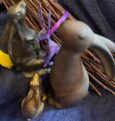(Content Warning – Mental health healing is messy, I suffered a mental break last year and this entry is basically stream of consciousness thoughts from therapy. Mentions CPTSD, ASD, ADHD and all that good stuff)
If you want me to apologise verbally then often I need to know because a lot of times when I’ve done something really wrong I start looking for ways to make it up to whoever I’ve wronged or how to fix whatever I’ve broken. As in with practical things or changes in behaviour or what have you.
Verbal apologies are things I have to actively think my way through because my reaction is often to dismiss them as things to virtue signal with, like they’re a pose rather than heartfelt. That’s because when I try to communicate directly in words without practicing it’s often been dismissed as insincere.
My assumption that people will automatically assume anything heartfelt from me is fake likely causes more problems than waiting to see if I was actually misunderstood would do.
But then demanding an apology from me turns out to be a trigger that I didn’t know I had. Specifically asking for an apology for something I’ve done that I didn’t know I did wrong (but I clearly am expected to have known). It’s absolutely a childhood thing, I’m smart how can I not have known this was wrong? That is so utterly textbook growing up without knowing you have ASD (possibly ADHD but I think it’s more likely the autism for this one) it’s not even funny.
But then it gets worse, “you’re so smart you can’t have not known”, ok so I’m a smart kid and the adults are telling me I should have been able to put the information together accurately. Then the behaviourism steps in, if I could have put the information together correctly but failed to do so then the failure to act appropriately must have been deliberate and therefore malicious.
Well ok, that all makes sense if I must have known this but did it anyway then I must be an awful person to do that maliciously. What kind of person even does that? Well they’re telling me that I did so I guess I’m that kind of person, gods I must be awful. So then you start to apologise, without really knowing what you did but piecing together that you can’t ask – because you’re supposed to have known – and you’re told your apology is insincere and insincere apologies don’t count.
Two things I get out of that – along with a lot of other rejections of my direct speech I communicate a lot by doing and by indirect words that most accurately convey my emotional truth – a lot of remorse and sadness. Because the thing about apologies is they have to be True which they can’t be because I can only apologise for the way I made someone hurt and not for the action because no one will explain to the smart kid what she apparently already knows she did wrong.
The second thing, I assume I’m literally the worst because I won’t let myself know in the moment what I’m doing wrong and yet in hindsight with all the adults angry at me I can often work it out. So I believe them when they tell me I did it deliberately, that I already knew what I was doing.
That thing I’ve had forever, the guilt for everything, that comes out of this. The worst thing though, is my automatic assumption of fault, completely and totally as if it was for deliberate action rather than mistake and misunderstanding. If someone tells me it’s my fault then I believe them because it’s built in along with the guilt.
But gods assumption that mistake is deliberate action, demanding an apology when I don’t know that I’ve done something wrong – it’s a perfect recipe for me to react as if I were eight.
